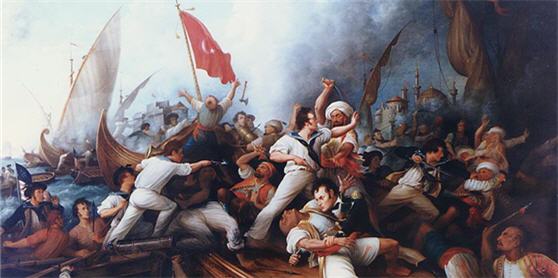
Amidst all the angst and astonishment about those wild and crazy Somali pirates, we seem to have forgotten that we’ve been through this movie before. It was more than two centuries ago when Muslim pirates were, after England, perhaps the most serious foreign threat bedeviling the new American republic. And the policy response too, is instructive today, though the issues raised are more complex.
It was Muslim pirates based in what is now Algeria that captured commercial ships and held those aboard as hostages who put at risk a U.S. trade in the Mediterranean in the late 18th and early 19th century. It was a problem that the first four U.S. presidents, from George Washington to James Madison, were humiliated and stifled by.
It is a nearly forgotten bit of history that the U.S. inadvertently bid up the price by paying ransom after ransom to the Barbary pirates. Ironically, it was this threat that really gave birth to a serious U.S. Navy. But it was not until George Washington’s second term, when in 1794 the U.S. commissioned the construction of six naval frigates. Only after the turn of the century, during Thomas Jefferson’s administration, did we attain the naval capability to begin confronting the threat head on. And it was not until the second Barbary wars in 1815 that President Madison ended the scourge once and for all.
So What?
What, you may be wondering does all this have to do today’s Somali pirates operating from a failed state (Somalia has not had a recognized government for nearly two decades) and getting increasingly brazen?
First, there is the familiar pattern. Only a couple of years ago the pirates were demanding ransoms of a few tens of thousands of dollars. Now they demands are in the millions, there are increasingly sophisticated and they are reaching new heights of Chutzpah. Ninety-five ships attacked and $150 million in ransom over the past year. Worse, they are still holding hostage some large-scale treasures: The pirates are holding:
- A hijacked Ukrainian ship loaded with tanks, heavy weapons and ammunition destined for Kenya, despite attack from U.S. and Russian ships;
- A Hong-Kong-flagged Iranian ship carrying Chinese grain bound for Iran captured on Nov.18, the same week they took a Saudi supertanker;
- A Saudi supertanker with two million tons of oil aboard.
What began in the 1990s as stealing food shipments for hungry Somalis has now become a serious threat to global shipping, raising insurance rates tenfold. Piracy off the Somali coast is up 75% this year over 2007. More disturbing, they are operating nearly 500 nautical miles offshore (the Saudi supertanker was 457 miles from shore when captured).
This situation should be viewed as a test of the international system. If there is such a thing as the often invoked “international community,” now is the time to step up to the plate. If NATO is in search of a new “strategic concept”, this may fall under such a rubric.
Challenge and Opportunities
If there is a silver lining in this predicament, it is the possibility of a truly global maritime response to a transnational global challenge. Much of the world routinely free rides on the prowess of the U.S. Navy. Indeed, the U.S. Navy’s Combined Task Force 150, with occasional support mainly from European allies, has been patrolling the waters in the Gulf of Aden since 2002.
As the piracy problem has mounted, other countries have begun to react. The Indian Navy recently took out a pirate ship in the Gulf of Aden. Malaysia also has responded, and last week, South Korea decided to send a ship to the area. But so far, we only have seen ad hoc and intermittent international action.
There is already an international legal basis for action: recently passed U.N. Security Council Resolution 1838 “calls upon all states interested in the security of maritime activities to take part actively in the fight against piracy on the high seas off the coast of Somalia, in particular by deploying naval vessels and military aircraft.” This denies the pirates legal maritime sanctuary.
The challenge – and opportunity – now is to create and sustain a large-scale, coordinated, multilateral maritime presence able to put these thugs out of business. Coordinated, standing patrols based on a division of labor covering much of the pirates operating area could really make a difference. It would require also working with international maritime authorities, and perhaps in partnership with international insurers.
To be sure there are some problematic aspects. How to determine rules of engagement, either coordinated or in some division of labor in such a coalition of the willing is one such problem. It may require a conference, with all those willing and able to commit maritime forces participating. In a world where trillions of dollars in goods routinely passes through global shipping lanes from the Gulf to the Straights of Malacca, maritime security would appear an issue that is a nearly universal common good, transcending divides North and South, developed and developing countries.
As the early Barbary pirates played a large role persuading a young nation of the importance of building a credible navy, perhaps the silver lining here is the opportunity for multilateral cooperation in defense of a public good.
Robert Manning is a senior advisor to the Atlantic Council. The views expressed here are solely his own, not those of any U.S. government agency. Painting “Decatur Boarding the Tripolitan Gunboat” by Dennis Malone Carter courtesy United States Navy.
Image: decatur-barbary-pirates_0.programthumb.jpg
